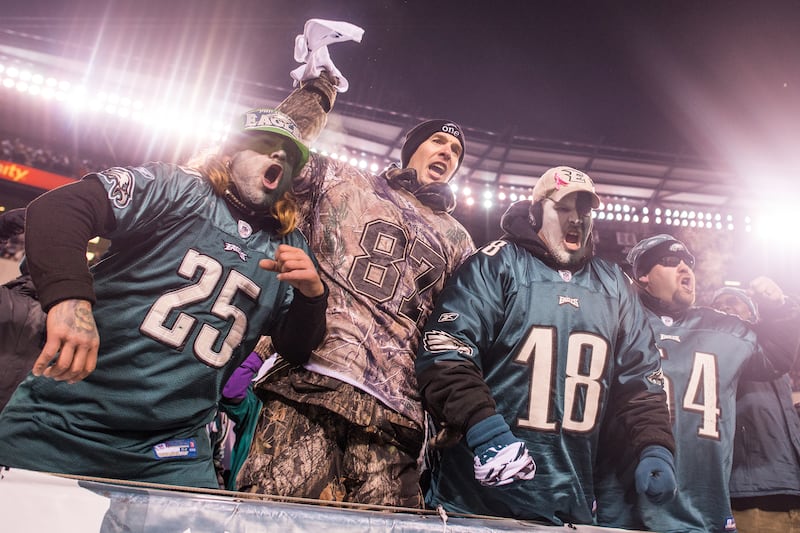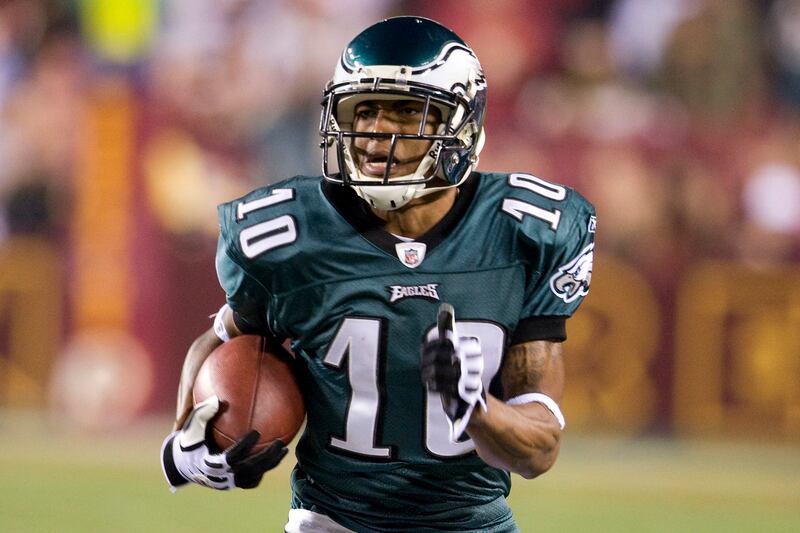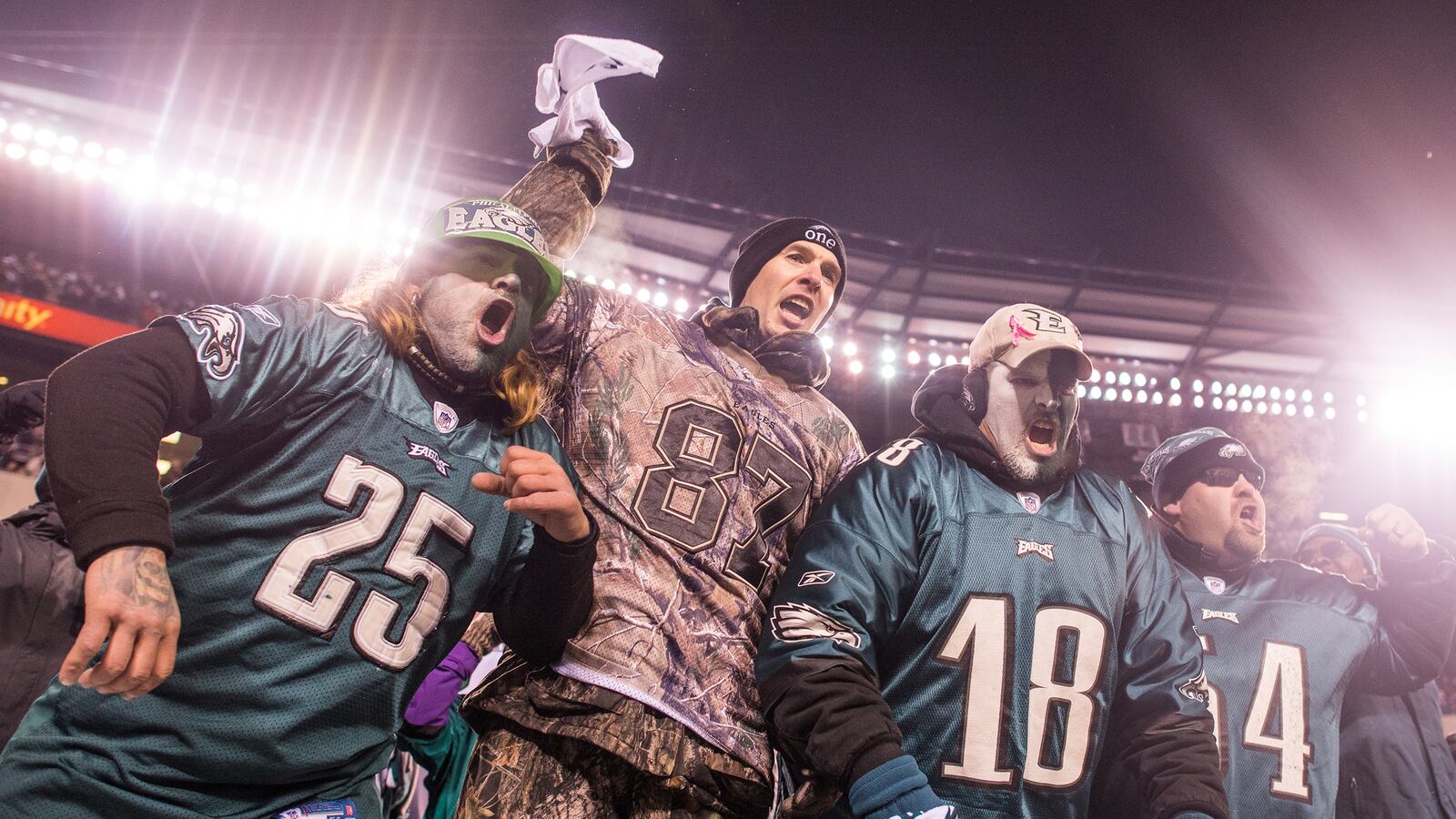There’s a scene early on in Silver Linings Playbook, filmmaker David O. Russell’s wacky potpourri of mental disease, familial dysfunction, and crabby snacks and homemades, that’s become a part of Philadelphia Eagles lore.

Pat Solitano, a whirling dervish of a man-child portrayed by Bradley Cooper, has just been sprung from a mental institution by his cheery mother. He’s to attend a dinner with his ex-wife’s bestie—the first of several steps in his demented scheme to win her back. But Pat’s been out of action for a while, and social decorum has never been his forte, so he asks his shrink if it’s fine to wear the Eagles jersey his brother bought him while he was locked away.
Which jersey?
DeSean Jackson.
DeSean Jackson is the man.
Well, that settles that.
For those unaware of who exactly DeSean Jackson is, he’s one of the most preternaturally gifted wide receivers in the game. Sure, he’s undersized at a shade under 5’10” and 170 pounds, but he has no problem separating from bigger defensive backs, and his quickness is astounding (faster than even his 4.35-second 40-yard dash time would indicate). He’s a massive fan favorite among those in the City of Brotherly Love, one of the top three receivers in all of football, and none other than Jerry Rice said that Jackson “has all the talent in the world.”
On Friday afternoon, the Eagles decided to release DeSean Jackson with the following two-sentence statement: “After careful consideration this offseason, Eagles decide to part ways with DeSean Jackson. The team informed him of his release today.” The move left fans of the team scratching their heads. Jackson had, after all, come off his best career as a pro: 82 receptions for 1,332 yards and nine touchdowns, and was selected to his third Pro Bowl. The rationale was... curious.
Earlier that day, the news website NJ.com ran an investigative story with the headline, “DeSean Jackson’s gang connections troubling to Eagles.” In it, they alleged that the Philly team had been shopping Jackson around to other organizations because they were concerned over his alleged gang connections, which made him “a potential blight on the brand and a bad influence in the locker room.”
The evidence presented in the story—if you can call it that—is that Jackson allegedly has connections to the L.A. gang the Crips because one of his friends, Theron Shakir, is a rumored Crips member and in 2010 was charged with (and later acquitted of) murder. Jackson was reportedly not part of the case at all. The other incident was a murder that occurred in 2012 outside a “South Los Angeles business where a party had taken place.” The building was “owned or leased by a member of Jackson’s family,” but once again, “Jackson was never considered a suspect,” according to the story. The only rock-solid “evidence” presented was Jackson flashing what appears to be a Crips sign on Instagram, as well as a 2009 arrest where Jackson was pulled over for having illegally tinted windows, and the officers found a bit of marijuana in the car.

Now, the Eagles knew about both these incidents and still signed him to a 5-year contract worth up to $51 million on March 14, 2012.
Jackson released the following statement after he was cut:
“I would like to address the misleading and unfounded reports that my release has anything to do with any affiliation that has been speculated surrounding the company I keep off of the field. I would like to make it very clear that I am not and never have been part of any gang. I am not a gang member and to speculate and assume that I am involved in such activity off the field is reckless and irresponsible.”
Jackson is, contrary to this off-field image people have cultivated for him, a pillar of the community. He runs The DeSean Jackson Foundation—a charity that does everything from promote literacy and educate youth about bullying, to fighting against pancreatic cancer, a disease which claimed Jackson’s father. Furthermore, Jackson’s segment on ESPN’s “My Wish” series, wherein he invited Donovan Troy, a 10-year-old boy who had his spleen removed as a toddler and requires monthly blood transfusions, to spend the day with him at the Eagles’ training facility in Philadelphia is a total tearjerker:
Perception, it seems, is everything when it comes to the Eagles, and by extension, the NFL post-Aaron Hernandez.
On Feb. 26, the Eagles signed wide receiver Riley Cooper to a 5-year contract worth $25 million. He had his biggest year yet as a pro, tallying 47 receptions for 835 yards and eight touchdowns, but had never topped 350 yards receiving in his previous three seasons.
The move, in light of Jackson’s release, was a puzzling one, for in July 2013, a video went viral depicting an inebriated Cooper in full-on redneck mode at a Kenny Chesney concert. He’s seen in the video sporting a cut-off red flannel shirt and yelling he’d “come backstage and fight every nigger here, bro.”
Cooper apologized, and was fined an undisclosed amount by the Eagles—the equivalent of a slap on the wrist. The incident not only enraged rapper Lil Wayne, but also threatened to divide the Eagles locker room, which is predominately black.
“He’s still a teammate,” said star running back LeSean McCoy. “I’m still going to block for him. I’m still gonna show great effort. Just on a friendship level, and as a person, I can’t really respect somebody like that.”
“He can’t undo the damage. I know he wishes he could,” added fellow receiver Jason Avant. “But you have to let it go because it will create an atmosphere of the whites in this corner or the blacks in this corner. We definitely don’t want that as a team or a society. The only way we can handle these things is to release yourself by forgiving.”
DeSean Jackson and Riley Cooper do not look alike.
Jackson scowls. He’s covered in tattoos and sports an unkempt beard. He pals around with rappers and has a questionable childhood friend. He showboats. He’s from South Los Angeles.
Cooper smiles. He has chiseled, tattoo-less arms and long, flowing chestnut brown hair. He drops N-bombs with his pals at country music shows. He doesn’t showboat. He’s from Oklahoma City.
Jackson is a three-time Pro Bowler and a top-three receiver who caught 82 receptions for 1,332 yards and nine touchdowns last season.
Cooper has been to zero Pro Bowls and had never topped 350 yards receiving before the 2013 season, when he caught 47 receptions for 835 yards and eight touchdowns.
Jackson is black. Cooper is white.
Jackson was shown the door. Cooper was rewarded.
Many, including former NFL running back Derrick Ward, comedian Chris Rock, and others took to Twitter to voice their disapproval:
The politics of perception in sports is a very strange thing indeed.





